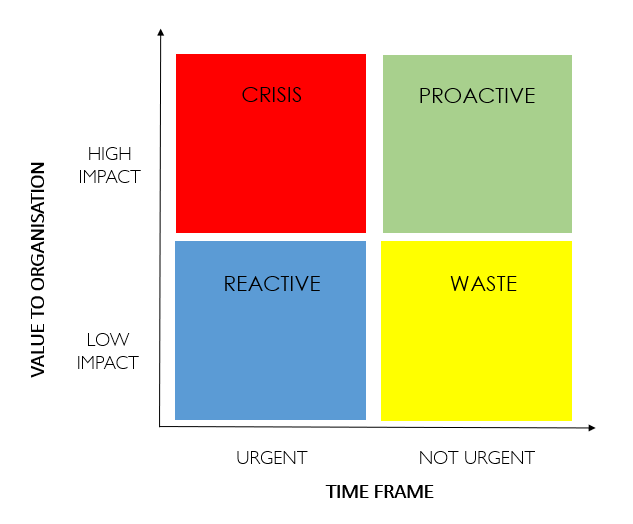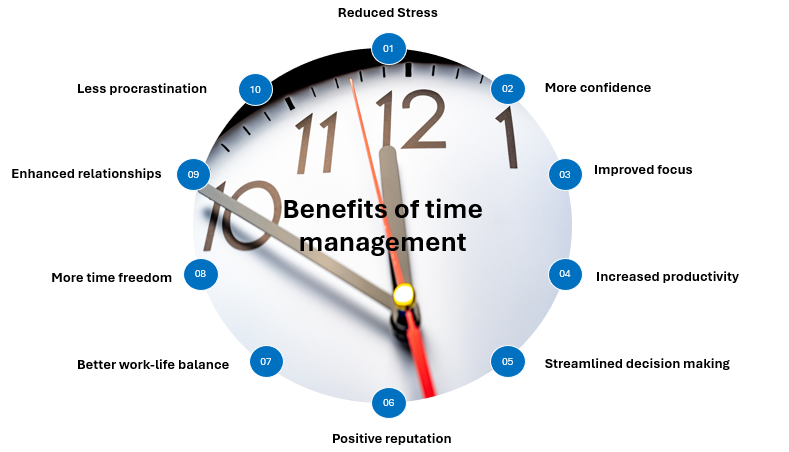- Home
- 7 Steps of Goal Setting
- The Importance of Time Management
The Importance of Time Management: Your path to a more balanced life
The importance of time management is more than to-do lists and personal organizers. The benefits of time management extend to your personal life, career success, and achieving goals. It is hard to overestimate the importance of time.
We've heard and probably said ourselves to "make the best of each day" or "live each day as though it was your last". These affirmations highlight the importance of time management - but usually they are not enough.

As someone who's been in the trenches of corporate life and working in helping high performers manage their workload, I understand how overwhelming it can feel when time seems to slip through your fingers like sand.
Knowing the importance of time management isn't just another business buzzword – it's your ticket to reclaiming control of your life.
To be clear, time management benefits aren't just about squeezing more work into your day (though that's definitely a perk). The definition of time management is about creating space in your life for what truly matters.
By making small changes in your work habits, you can make big changes in your life, whether that's finally having time for that gym session you've been postponing or making it home for dinner with your family.
The importance of time management is highlighted by the number of benefits it gives you.
Increased productivity.
When you are clear on your goals and have the self-discipline to focus on them, your output doesn't just increase; it improves in quality too. But don’t take my word for it, as there is plenty of research to back this up.
Better decision making.
When you're not constantly in crisis mode, you can think more clearly and make better choices. For example, when I use the Eisenhower Matrix, clients soon realise that not all tasks are created equal. By learning to distinguish between important and urgent tasks, you are able to compartmentalize tasks as do now, plan for later, delegate, or delete.
Reduced stress.
When you are in control of your schedule you are less likely to feel like you are jumping from one crises to the next. This moves you from reactive to proactive mode, allowing you to address potential issues before they become full-blown problems.
Greater time freedom.
When you eliminate timewasters, such
as ineffective meetings, low value interruptions, or servitude to the email;
and use that time to focus on high-priority tasks, pockets of free time you
never knew existed will open up. This ripple effect extends far beyond your
desk as you have more bandwidth for your team, more time to plan, or more time
to relax.
Better relationships.
If you are a poor time manager relationship can often suffer. This less cancelled plans, less rushed conversations, more time for relationship building. This can only help you to keep your commitments, both professional and personal.
I like to think of time management as your personal productivity superpower. It's like having a remote control for your day – you get to decide what gets played when, and more importantly, what gets put on pause. The beauty is, it's not as complicated as it might seem. In fact, the basics are surprisingly easy to learn and implement.
What can you do today?
Time management strategies you can put in place today.
Effective time management is about applying practical tools to do the important stuff. By incorporating these strategies into your daily routine you can optimize your use of time, and ensure you do what matters most.
1. Set clear goals
Start by identifying what matters most to you by setting goals. By setting specific, measurable, attainable, realistic, and time-bound goals (SMART goals) you have a sense of direction. Knowing what you want makes allocating your time straightforward.
2. Prioritization.
Once you have set your goals, I like the Eisenhower Matrix to prioritize my tasks. By sorting your tasks into urgent and/or important tasks you can identify the crucial tasks to get done now, what needs to be planned later into your calendar, and potential tasks that can be reduced, delegated, or deleted.
When I was working with a leader of a large bank earlier this year, he mentioned that this provided clarity in decision making.
3. Planning and then schedule.
Dale Carnegie once said, “An hour of planning can save you 10 hours of doing”. What many people don’t realise is that planning occurs on many levels, there is
- long-term planning, such as a 5 year strategic plan or your KPI document at work
- quarterly, planning,
- weekly planning, which is refined on a daily basis.
By breaking down the larger assignments into smaller more realistic steps and allocating time to these, you are creating the space to do these important tasks
4. Time blocking
By dedicating specific blocks of time to do different activities you are batching like with like but also taking advantage of peak productivity times. Examples of dedicating blocks of uninterrupted time include
- focused work,
- emails, meetings, and
- personal activities.
Time blocking improves focus, reduces distractions, and reduces decision fatigue.






New! Comments
Have your say about what you just read! Leave me a comment in the box below.